Q&A: Navigating the Background Check and FCRA Compliance Minefield
Catherine E. Walters, Esq., partner at Bybel Rutledge LLP and Chair of the firm’s Employment/Labor Law Group, presented the webinar “Navigating the Background Check and FCRA Compliance Minefield.” Ms. Walters returned to answer many commonly asked questions.

Q: With respect to salary history bans, let’s say we are willing to pay a position in a range between $40,000 and $50,000, or some other range, depending on experience and other qualifications – – if we can’t ask a candidate about his or her salary history, how can we avoid wasting time on applicants who would have been excluded from consideration if we had known how high their salary expectations were up front?
A: This is interesting. These rules are intended to close the gender and race pay gaps by preventing employers from using an applicant’s salary history to determine future compensation. Unfortunately, this also prevents a candidate and a prospective employer from being able to determine whether there is a potential wage match early in the process, extending both the applicant’s job search and the prospective employer’s hiring process until an offer is made. If the wages ultimately offered by the employer are too low and the applicant moves on, both the applicant and the employer have lost valuable time. Two thoughts:
- First, employers may generally ask an applicant about his or her salary requirements. In such cases, an applicant who responds honestly takes the chance that s/he is setting the target too high for the employer’s intended range and the parties can move on more quickly. Although it is also possible that a candidate will provide a salary target that is lower than the candidate really wants, employers are still required to pay equal pay for equal work (with some qualifiers based on education, experience, etc.), and the salary history ban becomes less relevant.
- Second, the employer may provide the applicant with a range of pay for the position, signaling the applicant as to what a potential wage offer would look like. Again, the applicant may be disappointed by the range and move on. Regardless, either approach should save both the applicant and the potential employer some time in the process.
Q: How should an employer with facilities in multiple states handle background check issues in view of the wide variations and disparities among states with salary history bans, credit check bans, criminal record bans and the like?
A: There are three basic approaches:
- First, some employers try to adapt their processes to each locality in which they recruit and hire, and thus must stay abreast of all of the DO’s and DON’Ts for each locality, which can be dangerous given the velocity at which these different laws are being instituted among states and municipalities.
- Second, some employers try to “dumb” their processes down to the lowest common denominator for each locale – also dangerous if you miss something.
- Third, many employers simply eliminate these steps from their initial application procedures and do the follow up after they have reached a point in the hiring process where it is safe to explore these concepts.
Different types of employers may be exempted from some or all of the bans based on the type of work involved; but the safest approach is to be as familiar as possible with the laws applicable to your hiring locales and to wait until after the applicant has been deemed qualified to move forward in your hiring process before instituting the types of background checks relevant to your needs. Of course, you should use background checks that are relevant to your business needs and the type of work involved regardless of locality!

Q: Our company does background and reference checking internally. How should we handle things that come up about a candidate in social media, such as their race, religious affiliation, age, sexual orientation and other protected characteristics? What if the candidate looks good in the background check but engages in unacceptable behavior caught on social media?
A: Employees engaged in background and reference checking should be thoroughly trained on employer DO’s and DON’Ts. If possible, separate your social media reviewers from the folks who will make initial decisions regarding a candidate’s suitability for employment with your company. This way, the initial decision about a candidate is not tainted by any knowledge of their protected characteristics that can be derived from social media, such as race, age, sexual orientation, religion, etc. If you are unable to separate these approaches from each other, then consider not using social media as part of the background checking process, or use it after an initial decision has been made about whether to pursue the candidate further.
Q: We are a healthcare provider having a tough time finding candidates without criminal histories. Do you have any ideas that could help us recruit more candidates?
A: Recall that the purpose of the EEOC’s Guidance and similar laws is to attempt to level the playing field for folks with records. Consider whether you are able to relax your current standards to accommodate candidates who have criminal records but for whom there may be mitigating circumstances or for whom the record has no relation to the job functions. Also, consider materials developed by the National Employment Law Project (NELP) and Safer Foundation entitled, A Healthcare Employer Guide to Hiring People with Arrest and Conviction Records
 Catherine E. Walters is a management-side labor and employment attorney representing employers of all sizes, including privately and publicly held companies, federal & state government contractors, institutions of higher education, trade associations, and other non-profits. She appears before federal and state courts & administrative agencies and currently is a partner at BYBEL RUTLEDGE LLP.
Catherine E. Walters is a management-side labor and employment attorney representing employers of all sizes, including privately and publicly held companies, federal & state government contractors, institutions of higher education, trade associations, and other non-profits. She appears before federal and state courts & administrative agencies and currently is a partner at BYBEL RUTLEDGE LLP.
Be sure to check out Catherine Walter’s webinar and explore our other online resources, such as our online compliance training courses, compliance posters, and our complimentary webinars and podcasts.

